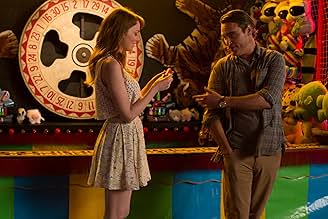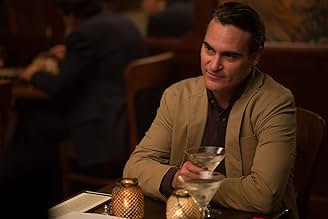CALIFICACIÓN DE IMDb
6.6/10
68 k
TU CALIFICACIÓN
Un profesor de filosofía encuentra voluntad y ganas para vivir cometiendo un acto existencial.Un profesor de filosofía encuentra voluntad y ganas para vivir cometiendo un acto existencial.Un profesor de filosofía encuentra voluntad y ganas para vivir cometiendo un acto existencial.
- Dirección
- Guionista
- Elenco
- Premios
- 3 nominaciones en total
Allie Gallerani
- Braylin Student
- (as Allison Gallerani)
- Dirección
- Guionista
- Todo el elenco y el equipo
- Producción, taquilla y más en IMDbPro
Argumento
¿Sabías que…?
- TriviaJoaquin Phoenix gained 33 pounds for the role.
- ErroresIn piano recitals using a grand piano, the piano is placed with the soundboard open towards the audience and the performer on the audience's left, so the music is amplified and directed to the audience. In Jill's recital, the soundboard is open but facing away from the audience and Jill is on the audience's right.
- Créditos curiososWhereas most of Woody Allen's films begin with a musical soundtrack, usually from the thirties or forties, alongside the credits, this one is almost silent, rising in volume until you hear traffic noise. Music is only heard when the credits end and Abe appears onscreen, and then it is much more modern music than usually accompanies Allen's intros.
- ConexionesFeatured in Flat Earth & Revelation 10: Reach the Oxygen (2016)
- Bandas sonorasThe 'In' Crowd
Composed by Billy Page
Performed by Ramsey Lewis Trio
Courtesy of The Verve Music Group
Under license from Universal Music Enterprises
Opinión destacada
Finally! A Woody Allen film with a linear plot and "what if" dilemmas disseminated all through a thought-provoking campus-set story, a symphony of thoughts and actions without any false note and that would catch any skeptical mind off-guard. Allen surely delivered on that one!
"Irrational Man" covers many philosophical questions about the rationality of individual "morality" and their possible interference with ethic. Abe, the newly hired philosophy teacher played by Joaquin Phoenix, doesn't believe the intellectual medicine he sells to his students, his dark and brooding attitude makes up for the lack of enthusiasm in his endeavor and is enough to earn admiration, if not fascination, but the man remains totally unsatisfied about himself and pretension isn't his strongest suit.
One day, he's given a test (not a taste) of his own medicine through an intellectual challenge that could only emerge from the creativity of Woody Allen: a situation that gives its full meaning to the word existentialism, a hackneyed word that only inspired vague interpretations of the word "accomplishment" but in the film, it's shown as a moral weapon, more specifically, a double-edged sword when confused with a sort of misguided sense of entitlement, a great illustration of the idea that hell is paved by good intentions... or maybe that quote from "Chinatown" that sums it up perfectly: "most people never have to face the fact that at the right time, the right place, they're capable of anything." Abe won't be one of these.
And so Abe undergoes a smooth transition from one state of mind to another as if we had to understand what's eating him before understanding what could regenerate his lust for life. Phoenix feels like overplaying the intellectual malcontent in quest for a meaning in the beginning and it takes not one but two women to try to break the ice and finds what's under that depressed carapace of his, Parker Posey is Rita the lively and sensual teacher who instantly falls in love and Jill is the brilliant student who has the typical crush on her charismatic teacher. See, the film offers so many common tropes to better avert them. Abe looks like your typical alcoholic womanizer but he's impotent and his suicidal impulses turn everybody off... when eventually things go better, he's wise enough to keep it platonic with Jill, because she's engaged, and if you think Jill will abandon everything to follow her teacher and do the right thing by breaking up with the dull boyfriend, you've got another thing coming.
As usual with the best Allen films, you have a fine set-up that introduces to characters with clearly drawn personalities but unclear motives and then there's something that changes everything: the motives get clearer and the personalities reveal new depths. It's a simple conversation overheard in a café that changes the course of Abe's life, triggering a new vision with a tangible effect on Jill and Rita. It's a decision that calls for an act, one of heavy proportions but deemed necessary because wishing is useless and action is meaningful. And from that point, the film is like a great waltz under a tertiary tempo: one for the triangular love and the way Abe's charm works way too much not to be an omen for complications, one for the moral dilemmas over which I hesitated to give a definite judgment, telling myself "that better goes somewhere" and finally a response to "Match Point" where 'bad things' went unpunished, and not even suspected.
In fact, the film is so smooth and engaging that the ending feels a bit hasty in its execution, sometimes the right thing to happen isn't necessarily the right one when it comes to end with a final "wow", but obviously, "Match Point" had already made its point and "Irrational Man" needed to take us back to some sanity. Many movies provide cynical examples of characters succeeding while being morally corrupt, and it's refreshing to have films that bravely set the "boring" but necessary moral aspect of the problem. Abe is an interesting character indeed, he draws us toward his charismatic personality to the point that our own convictions are challenged... to a limit of course. And it's for movies like these that I've always admired Woody Allen and after the disappointing "You will Meet a Tall and Dark Stranger", here's one that succeeds in almost every department.
Not too many characters but what's there is three-dimensional, unpredictable yet consistent, a plot that goes through many fluctuations while attached to its spinal topics and that little zest of wit that tickles your intellect and makes you wonder what you'd do if you were in "their" place. The film saddened me when I thought of the director's recent downfall into persona non grata territory. I've taken his last movies like consolations, if he's lost his touch then there was no need to go further, maybe his creative juice had stopped to drain such clever and brilliant films but "Irrational Man" made me reconsider, Allen can still surprise you... and he does it so brilliantly that I would separate the art from the artist, and I wish enough actors in Hollywood would do it so the only true Hollywood auteur can make movies like this, disinterested and interesting, devoid of any calculation except for giving a shot to "it" actresses, like Emma Stone who delivers a terrific performance one year before her Oscar-winning role in "La La Land".
The film restored my faith in Woody Allen, his "Café Society" left me cold but I guess there's a pattern in his long filmography, every 2-3 years, he makes 'that' film that feels undeniably good, if not great. "Irrational Man" is the second highest point of the 2010s after "Midnight in Paris", I wish there's enough time for Allen to make one great film... might be his last from the way things are going.
"Irrational Man" covers many philosophical questions about the rationality of individual "morality" and their possible interference with ethic. Abe, the newly hired philosophy teacher played by Joaquin Phoenix, doesn't believe the intellectual medicine he sells to his students, his dark and brooding attitude makes up for the lack of enthusiasm in his endeavor and is enough to earn admiration, if not fascination, but the man remains totally unsatisfied about himself and pretension isn't his strongest suit.
One day, he's given a test (not a taste) of his own medicine through an intellectual challenge that could only emerge from the creativity of Woody Allen: a situation that gives its full meaning to the word existentialism, a hackneyed word that only inspired vague interpretations of the word "accomplishment" but in the film, it's shown as a moral weapon, more specifically, a double-edged sword when confused with a sort of misguided sense of entitlement, a great illustration of the idea that hell is paved by good intentions... or maybe that quote from "Chinatown" that sums it up perfectly: "most people never have to face the fact that at the right time, the right place, they're capable of anything." Abe won't be one of these.
And so Abe undergoes a smooth transition from one state of mind to another as if we had to understand what's eating him before understanding what could regenerate his lust for life. Phoenix feels like overplaying the intellectual malcontent in quest for a meaning in the beginning and it takes not one but two women to try to break the ice and finds what's under that depressed carapace of his, Parker Posey is Rita the lively and sensual teacher who instantly falls in love and Jill is the brilliant student who has the typical crush on her charismatic teacher. See, the film offers so many common tropes to better avert them. Abe looks like your typical alcoholic womanizer but he's impotent and his suicidal impulses turn everybody off... when eventually things go better, he's wise enough to keep it platonic with Jill, because she's engaged, and if you think Jill will abandon everything to follow her teacher and do the right thing by breaking up with the dull boyfriend, you've got another thing coming.
As usual with the best Allen films, you have a fine set-up that introduces to characters with clearly drawn personalities but unclear motives and then there's something that changes everything: the motives get clearer and the personalities reveal new depths. It's a simple conversation overheard in a café that changes the course of Abe's life, triggering a new vision with a tangible effect on Jill and Rita. It's a decision that calls for an act, one of heavy proportions but deemed necessary because wishing is useless and action is meaningful. And from that point, the film is like a great waltz under a tertiary tempo: one for the triangular love and the way Abe's charm works way too much not to be an omen for complications, one for the moral dilemmas over which I hesitated to give a definite judgment, telling myself "that better goes somewhere" and finally a response to "Match Point" where 'bad things' went unpunished, and not even suspected.
In fact, the film is so smooth and engaging that the ending feels a bit hasty in its execution, sometimes the right thing to happen isn't necessarily the right one when it comes to end with a final "wow", but obviously, "Match Point" had already made its point and "Irrational Man" needed to take us back to some sanity. Many movies provide cynical examples of characters succeeding while being morally corrupt, and it's refreshing to have films that bravely set the "boring" but necessary moral aspect of the problem. Abe is an interesting character indeed, he draws us toward his charismatic personality to the point that our own convictions are challenged... to a limit of course. And it's for movies like these that I've always admired Woody Allen and after the disappointing "You will Meet a Tall and Dark Stranger", here's one that succeeds in almost every department.
Not too many characters but what's there is three-dimensional, unpredictable yet consistent, a plot that goes through many fluctuations while attached to its spinal topics and that little zest of wit that tickles your intellect and makes you wonder what you'd do if you were in "their" place. The film saddened me when I thought of the director's recent downfall into persona non grata territory. I've taken his last movies like consolations, if he's lost his touch then there was no need to go further, maybe his creative juice had stopped to drain such clever and brilliant films but "Irrational Man" made me reconsider, Allen can still surprise you... and he does it so brilliantly that I would separate the art from the artist, and I wish enough actors in Hollywood would do it so the only true Hollywood auteur can make movies like this, disinterested and interesting, devoid of any calculation except for giving a shot to "it" actresses, like Emma Stone who delivers a terrific performance one year before her Oscar-winning role in "La La Land".
The film restored my faith in Woody Allen, his "Café Society" left me cold but I guess there's a pattern in his long filmography, every 2-3 years, he makes 'that' film that feels undeniably good, if not great. "Irrational Man" is the second highest point of the 2010s after "Midnight in Paris", I wish there's enough time for Allen to make one great film... might be his last from the way things are going.
- ElMaruecan82
- 20 may 2019
- Enlace permanente
Selecciones populares
Inicia sesión para calificar y agrega a la lista de videos para obtener recomendaciones personalizadas
- How long is Irrational Man?Con tecnología de Alexa
Detalles
- Fecha de lanzamiento
- País de origen
- Sitios oficiales
- Idioma
- También se conoce como
- Irrational Man
- Locaciones de filmación
- Productoras
- Ver más créditos de la compañía en IMDbPro
Taquilla
- Presupuesto
- USD 11,000,000 (estimado)
- Total en EE. UU. y Canadá
- USD 4,030,360
- Fin de semana de estreno en EE. UU. y Canadá
- USD 175,312
- 19 jul 2015
- Total a nivel mundial
- USD 27,391,084
- Tiempo de ejecución1 hora 35 minutos
- Color
- Mezcla de sonido
- Relación de aspecto
- 2.35 : 1
Contribuir a esta página
Sugiere una edición o agrega el contenido que falta

Principales brechas de datos
By what name was Un hombre irracional (2015) officially released in India in Hindi?
Responda



































